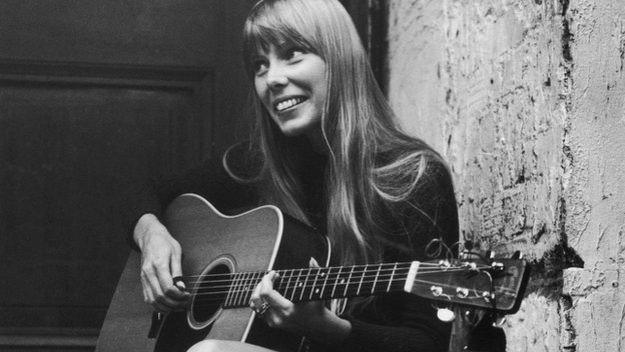Joni Mitchell: Seven essential songs
- Published
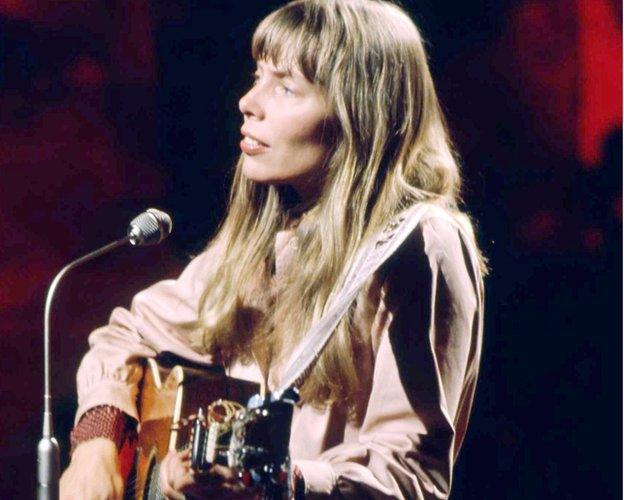
Joni Mitchell playing at the BBC in 1972
Joni Mitchell describes herself as a "painter who writes songs" with a "little helium voice".
She only started singing in the mid-60s "for smoking money," she once told, external US radio station NPR.
But her richly detailed, confessional lyrics changed folk music.
Before Mitchell, singer-songwriters concentrated on love and politics. After her, they sang about themselves - their fears, their pain, and how the loss of a lover can leave you feeling, external: "The bed's too big, the frying pan's too wide."
Her reputation as a fragile, confessional lyricist does her a disservice. Mitchell's writing may be unflinchingly personal, but it is also rich with imagery and engaged with the world beyond her "yellow curtains".
"My work has always contained the question of how far the pop song could go. What themes it could hold without collapsing," she once said.
Her most famous compositions are the poem-songs she released during her early, Laurel Canyon years, but she was incorporating jazz and world music in her work long before it became fashionable.
"My music is not designed to grab instantly," she once said. "It's designed to wear for a lifetime, to hold up like a fine cloth."
It would be impossible to select a definitive list of her best songs, but here is a quick guide to seven of the most popular ones.

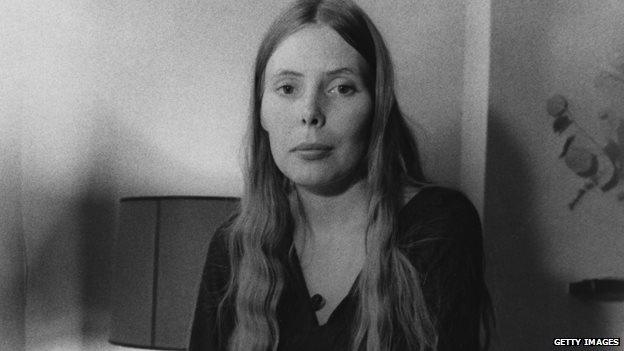
Born in Canada, Mitchell's most famous songs were written after she moved to California
1) River
Covered more than 200 times by the likes of Tori Amos, Herbie Hancock, Linda Ronstadt and Aimee Mann, River is one of Mitchell's most enduring songs.
Featured on 1971's Blue album, its spare, piano-driven arrangement paints a vivid picture of loss and self-recrimination, with Mitchell facing Christmas with no-one to kiss under the mistletoe.
Key lyric: "I wish I had a river I could skate away on / I wish I had a river so long / I would teach my feet to fly."

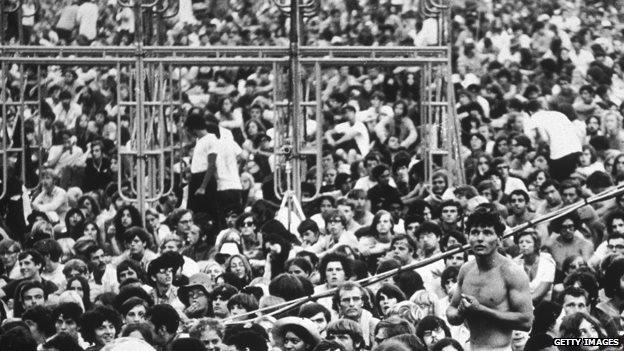
Woodstock captured the freewheeling idealism of the hippie music festival
2) Woodstock
Made famous by Crosby, Stills, Nash and Young, whose hard-rocking version, external is a stark contrast to Mitchell's stripped-down, intimate performance where her multi-tracked voice is set against a simple Wurlitzer electric piano.
A tribute to the 1969 festival of peace, love and music, the song is quiet and thoughtful when the event was anything but.
Mitchell famously did not attend Woodstock, basing her lyrics on the (undoubtedly hazy) recollections of her then-boyfriend, Graham Nash.
Key lyric: "We are stardust / We are golden/ And we've got to get ourselves / Back to the garden."

3) A Case Of You
A devastatingly gorgeous ballad, A Case Of You captures the nuances and complications of an affair in its dissolution.
"You are in my blood like holy wine," sings Mitchell, seemingly drunk on love, before delivering the killer blow: "I could drink a case of you and still be on my feet."
But the song also captures her ambiguity over ending the relationship: "Love is touching souls / Surely you touched mine / 'Cause part of you pours out of me / In these lines from time to time."
Arguably Mitchell's best composition, A Case Of You is tucked away at the end of Blue, and exemplifies the album's searingly intense lyrics.
"The Blue album, there's hardly a dishonest note in the vocals," she told Cameron Crowe in a 1979 interview for Rolling Stone.
"At that period in my life, I had no personal defences. I felt like a cellophane wrapper on a pack of cigarettes.
"I felt like I had absolutely no secrets from the world and I couldn't pretend in my life to be strong. Or to be happy. But the advantage of it in the music was that there were no defences there either."
Key lyric: "I could drink a case of you / And still be on my feet."

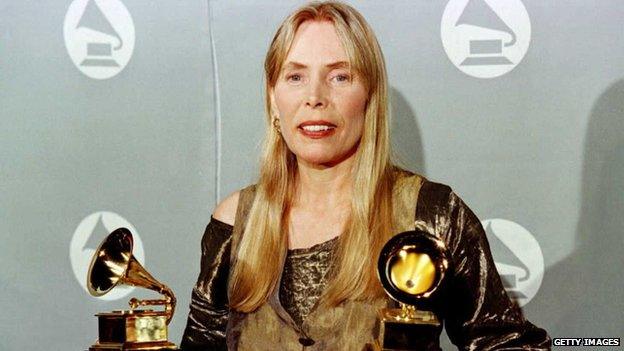
The singer-songwriter has collected eight Grammys over her career
4) Free Man In Paris
A reflection on the demands of fame, Free Man In Paris is more exuberant and funny than most musicians' stories of "screaming in a hotel room".
Mitchell adopts the voice of her record-executive friend David Geffen as he enjoys a worry-free weekend in France, neatly capturing the tension between having power and wanting freedom.
Key lyric: 'I was a free man in Paris / I felt unfettered and alive / There was nobody calling me up for favours / And no one's future to decide / You know I'd go back there tomorrow / But for the work I've taken on / Stoking the star-maker machinery / Behind the popular song."

5) Big Yellow Taxi
An upbeat sing-along that hides a message about imminent ecological disaster, Big Yellow Taxi is Mitchell's biggest radio hit - and her only top 40 single in the UK, reaching number 11 in 1970.
She wrote it after a trip to Hawaii, where she arrived at her hotel in the dead of night.
"When I woke up the next morning, I threw back the curtains and saw these beautiful green mountains in the distance. Then, I looked down and there was a parking lot as far as the eye could see, and it broke my heart... this blight on paradise. That's when I sat down and wrote the song."
Key lyric: "They paved paradise / And put up a parking lot."
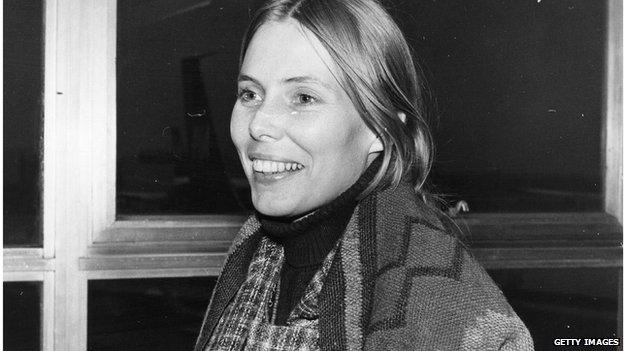
Mitchell's last album was released in 2007, and she has quit touring for health reasons
6) Help Me
Mitchell's biggest hit in the States, Help Me is one of her most straightforward compositions - a shimmering, swooning love song that largely adheres to pop's verse-chorus structures.
It finds the singer helplessly falling for a man she knows is bad news: "A rambler and a gambler and a sweet-talking-ladies man."
It's a favourite of funk musician Prince, who references it in The Ballad of Dorothy Parker, from his 1987 album Sign O The Times.
Key lyric: "Help me / I think I'm falling in love again / When I get that crazy feeling, I know / I'm in trouble again."

7) Both Sides Now
Written in 1967 and originally recorded by Judy Collins, Both Sides Now stemmed from the failure of Mitchell's first marriage and her decision to give up her daughter for adoption.
It uses clouds as a metaphor for the loss of innocence - how a child pictures "ice cream castles in the air", but adults only see a portent of bad weather.
Written when she was 21, the world-weary lyrics sat uncomfortably on Mitchell's young shoulders - but her 2000 re-recording is darker and wiser.
"It took a mature woman to bring it to life," Mitchell once said.
Key lyric: "I've looked at love from both sides now / From give and take and still somehow /It's love's illusions I recall."
Listen to Both Sides Now, external (1969) and the 2000 re-recording, external.
- Published1 April 2015
